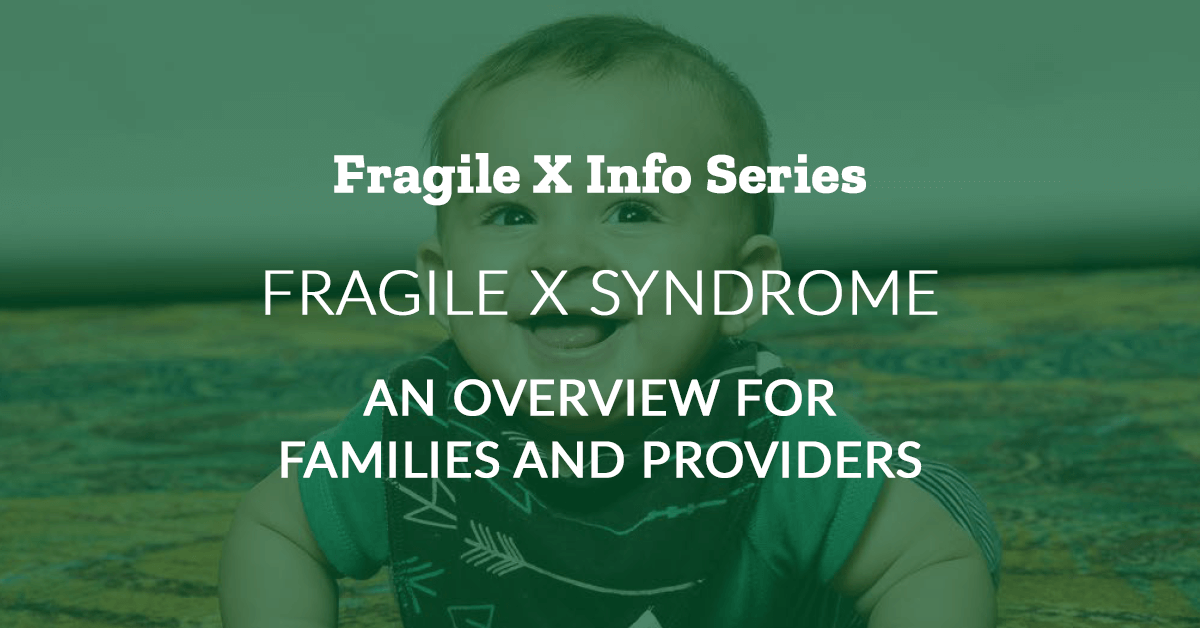Fragile X Syndrome | FXS
Fragile X syndrome (FXS) is a genetic condition that causes intellectual disability, behavioral and learning challenges, and various physical characteristics. Though FXS occurs in both genders, males are more frequently affected than females, and generally with greater severity. Life expectancy is not affected in people with FXS because there are usually no life-threatening health concerns associated with the condition.
Prevalence
 FXS has been detected in all populations and ethnic groups. As a result, efforts have been made to determine the overall prevalence of FXS and the difference in prevalence between males and females.
FXS has been detected in all populations and ethnic groups. As a result, efforts have been made to determine the overall prevalence of FXS and the difference in prevalence between males and females.
There have been a number of studies undertaken both in the “special needs” population and the general population aimed at determining the prevalence of FXS in males and females. The agreed upon prevalence of FXS in males is approximately 1 in 7,000 and in females 1 in 11,000.
The reason there are fewer females with FXS than males is that the gene for FXS is located on the X chromosome.
- Males (XY) — having only one X chromosome — will develop FXS because they have a mutation of their single (only) X chromosome.
- Females (XX) — having two X chromosomes — can have the unaffected X reduce the effects of the affected X, which typically leads to no or milder symptoms of FXS. (This is an important distinction, as many females with the full mutation do not consider themselves, nor are they considered by others, to “have” FXS.)
While researchers do not have an exact number for how many Americans (males and females) could have full-mutation Fragile X syndrome, the ratios noted above suggest that the raw number of individuals could be as low as 38,000 or as high as 87,000. (Worldwide, the number could be between 777,000 and 1,400,000.) However, it’s important to note that some published papers suggest greater prevalence and some lower prevalence than the numbers cited above.
Signs & Symptoms
In Males
Behavioral characteristics can include ADD, ADHD, autism and autistic behaviors, social anxiety, hand-biting and/or flapping, poor eye contact, sensory disorders, and increased risk for aggression.
Intellectual disabilities in FXS include a range from moderate learning disabilities to more severe intellectual disabilities. The majority of males with Fragile X syndrome demonstrate significant intellectual disability.
Physical features may include large ears, long face, soft skin, and large testicles (called “macroorchidism”) in post-pubertal males. Connective tissue problems may include ear infections, flat feet, high arched palate, double-jointed fingers, and hyper-flexible joints. No one individual will have all the features of FXS, and some features, such as a long face and macroorchidism, are more common after puberty.
Disposition: They are also very social and friendly, have excellent imitation skills, have a strong visual memory/long term memory, like to help others, are nice, thoughtful people, and have a wonderful sense of humor.
In Females
Behavioral characteristics seen in males can also be seen in females, though females often have milder intellectual disability and a milder presentation of the syndrome’s behavioral and physical features.
Intellectual disabilities: About one-third of females with FXS have a significant intellectual disability. Others may have moderate or mild learning disabilities, emotional/mental health issues, general anxiety, and/or social anxiety.
A small percentage of females who have the full mutation of the FMR1 gene that causes FXS will have no apparent signs of the condition—intellectual, behavioral, or physical. These females are often identified only after another family member has been diagnosed.
Be a part of the solution.
Learn more about the INTERNATIONAL FRAGILE X PREMUTATION REGISTRY and join individuals with the premutation and their families to help advance — and encourage — deeper understanding and research into the premutation condition.
Be a part of the solution.
Learn more about the International Fragile X Premutation Registry and join individuals with the premutation and their families to help advance — and encourage — deeper understanding and research into the premutation condition.
Testing
During the 1970s and 1980s the only available tool for diagnosing FXS was the chromosome (i.e., cytogenetic) test. While it was helpful, it was not always accurate. In the 1990s, scientists identified the FMR1 gene that causes FXS, and accurate DNA testing became available. The FMR1 DNA Test (sometimes called the Fragile X DNA Test) thus replaced chromosome testing and became the standard of care for determining the presence of Fragile X. DNA testing detects more than 99% of individuals (both males and females) with FXS, as well as Fragile X carriers.
Treatment & Intervention
While there is currently no cure for FXS, there are many areas of treatment and intervention that can improve the lives of affected individuals and their families. Given the proper education, therapy, and support, all persons with FXS can make progress.
Most children with FXS qualify for special education services. Education can be complemented by a variety of therapies that will help your child become more independent in the transitions from childhood through adolescence and into adulthood.
From the fragile x info series
Fragile X Info Series flyers are designed to be easily printable on home and office printers. We created them so you can distribute them as needed, whether it’s for a neighbor, students at school, your own reference, or you work at a clinic and want to share information with new families. Whatever the cause, they are meant to be informative and shareable.





